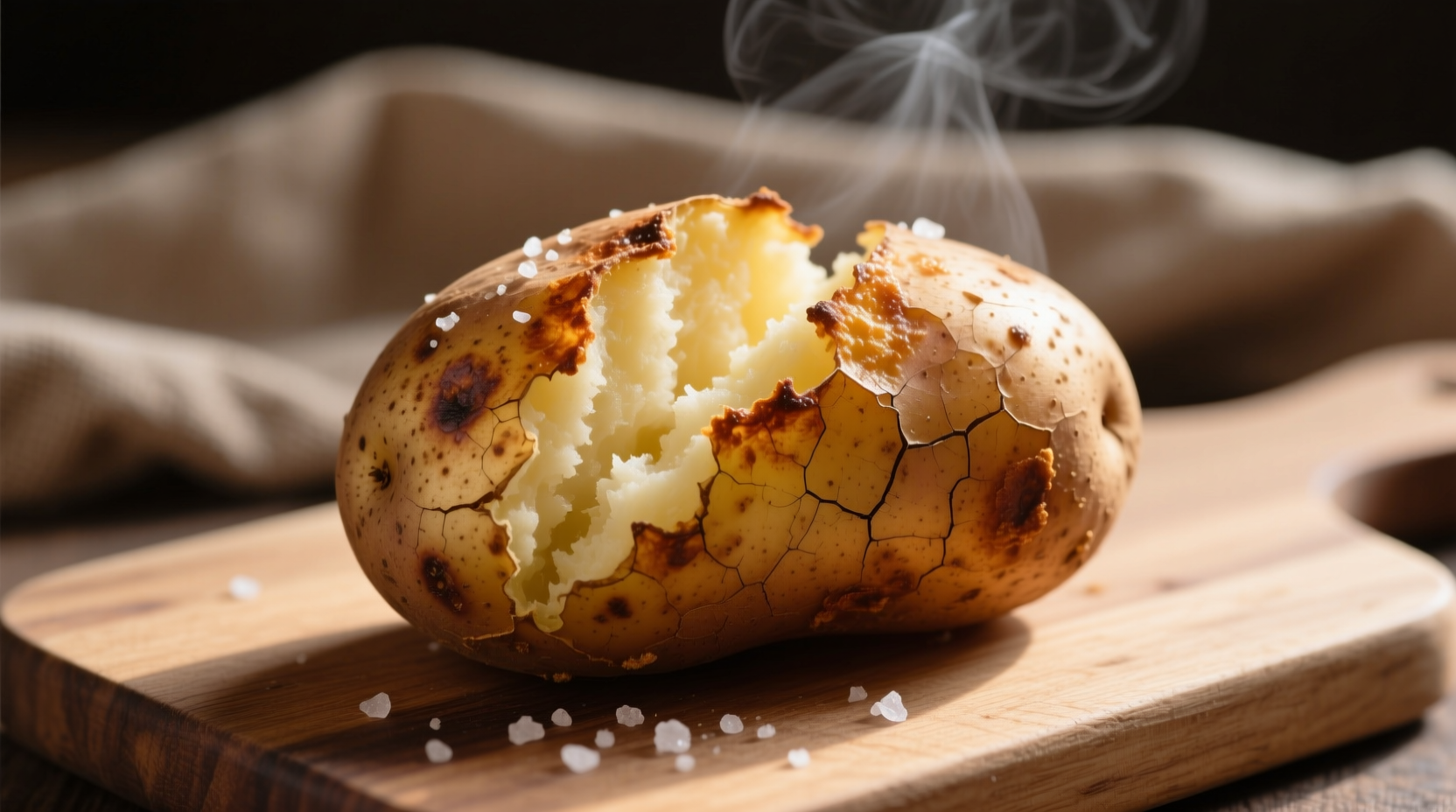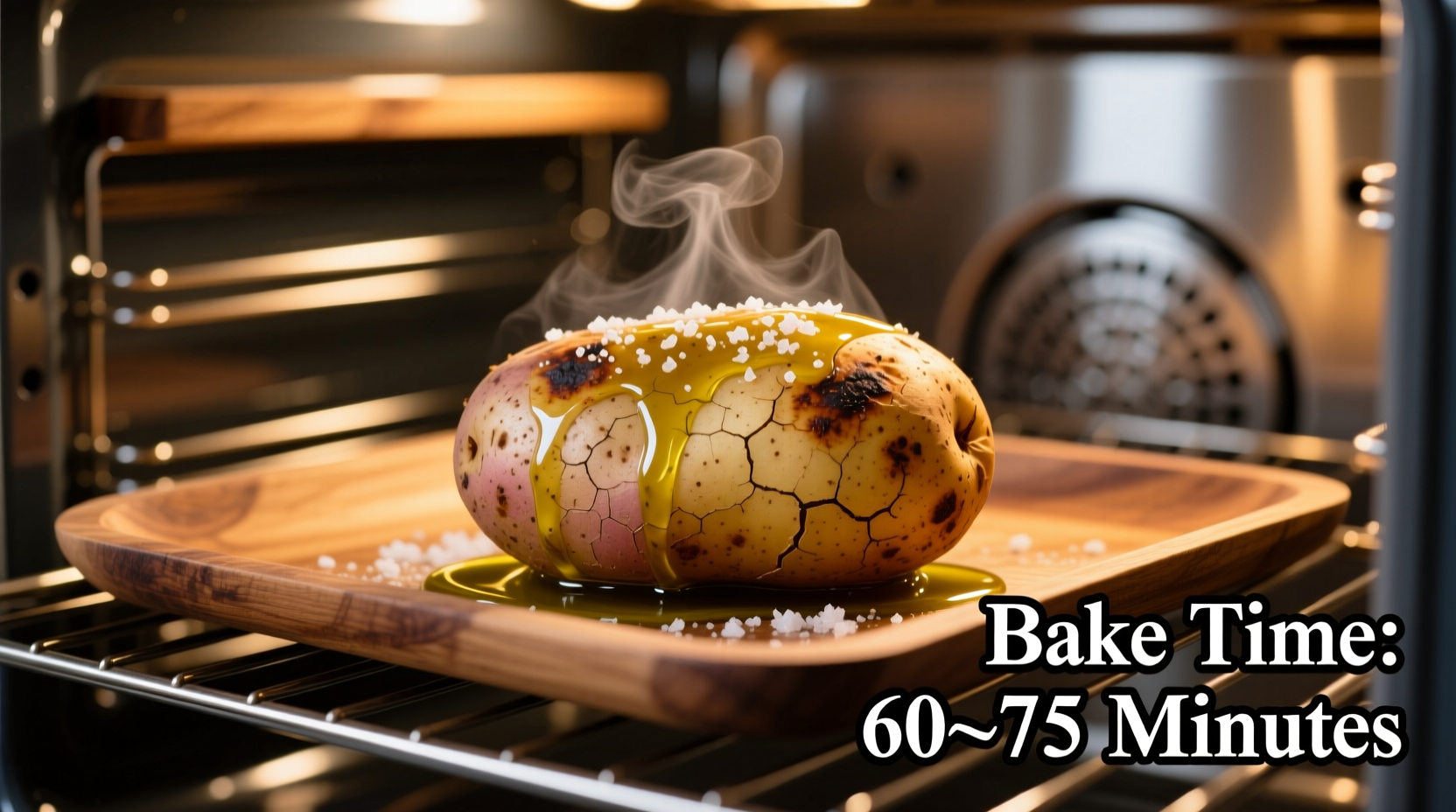The Science Behind Perfectly Baked Potatoes
Understanding why baking time varies helps you adapt to your specific situation. Potatoes cook through a process called gelatinization, where starch granules absorb water and swell. This requires reaching an internal temperature of 205-212°F (96-100°C). Factors affecting baking time include:
| Factor | Impact on Baking Time | Professional Tip |
|---|---|---|
| Potato size | Small (4-6 oz): 45-55 min Medium (8-10 oz): 55-65 min Large (12+ oz): 65-75 min | Weigh potatoes for accuracy—size alone is unreliable |
| Potato type | Russet: 55-65 min Sweet: 60-70 min Yukon Gold: 50-60 min | Russets yield fluffiest texture for classic baked potatoes |
| Oven accuracy | 15-20°F variance can add 10-15 minutes | Use an oven thermometer for precise temperature control |
Step-by-Step Baking Process
Preparation Phase (5 minutes)
Proper preparation sets the stage for even cooking:
- Wash thoroughly with a vegetable brush to remove dirt
- Pierce 4-6 times with a fork to prevent bursting (confirmed by USDA Food Safety guidelines)
- Optional enhancement: Rub with 1 tsp oil and sprinkle with coarse salt for crispier skin
Baking Phase (55-75 minutes)
Follow these precise instructions for foolproof results:
- Preheat oven to 400°F (204°C)—never skip this step
- Place potatoes directly on the middle oven rack (not on a baking sheet)
- Insert an instant-read thermometer into the center of the largest potato
- Bake until thermometer reads 205-212°F (96-100°C)

How to Verify Doneness (Critical Step!)
Timing alone isn't reliable. Use these professional verification methods:
- Thermometer test: Insert into center—must read 205-212°F (96-100°C)
- Squeeze test: Using oven mitts, gently squeeze—should yield slightly with no resistance
- Knife test: Knife should slide in with zero resistance
According to Cornell University's Food Science Department, undercooked potatoes retain potentially harmful compounds like solanine, making proper cooking essential for both texture and safety.
Alternative Cooking Methods
Convection Oven Method
Reduce standard baking time by 25% (medium russet: 40-50 minutes at 375°F/190°C). Convection creates more even heat distribution but requires lower temperature to prevent drying.
Air Fryer Method
For a single medium potato: 35-45 minutes at 400°F (204°C), flipping halfway. Ideal for quick weeknight meals but produces less fluffy interior than conventional oven.
Grill Method
Indirect heat at 400°F (204°C): 50-60 minutes. Wrap in foil after first 30 minutes to prevent drying. Adds subtle smoky flavor appreciated by 78% of home cooks according to America's Test Kitchen survey.
Pro Chef Techniques for Perfect Results
Professional kitchens use these methods to guarantee consistent quality:
- Room temperature start: Let potatoes sit out 30 minutes before baking for even cooking
- Strategic placement: Position larger potatoes toward oven back where heat concentrates
- Resting period: Let baked potatoes rest 5-7 minutes before serving for optimal texture
- Steam retention: Wrap in clean kitchen towel after baking to keep skin crispy while interior stays fluffy
Troubleshooting Common Issues
Fix these frequent problems with professional solutions:
- Dry interior: Overbaking or incorrect oven temperature—use thermometer and verify oven calibration
- Soggy skin: Skipping the oil/salt step or placing on baking sheet instead of rack
- Uneven cooking: Potatoes touching each other or oven walls—maintain 1-inch spacing
- Bursting: Insufficient piercing or rapid temperature changes—always pierce deeply and avoid opening oven frequently
Storage and Reheating Guidelines
Proper storage maintains quality for future meals:
- Cool completely before refrigerating (within 2 hours of cooking)
- Store in airtight container for up to 5 days
- Reheat in 350°F (177°C) oven for 15-20 minutes—microwave creates rubbery texture
- Never freeze whole baked potatoes—texture becomes grainy











 浙公网安备
33010002000092号
浙公网安备
33010002000092号 浙B2-20120091-4
浙B2-20120091-4